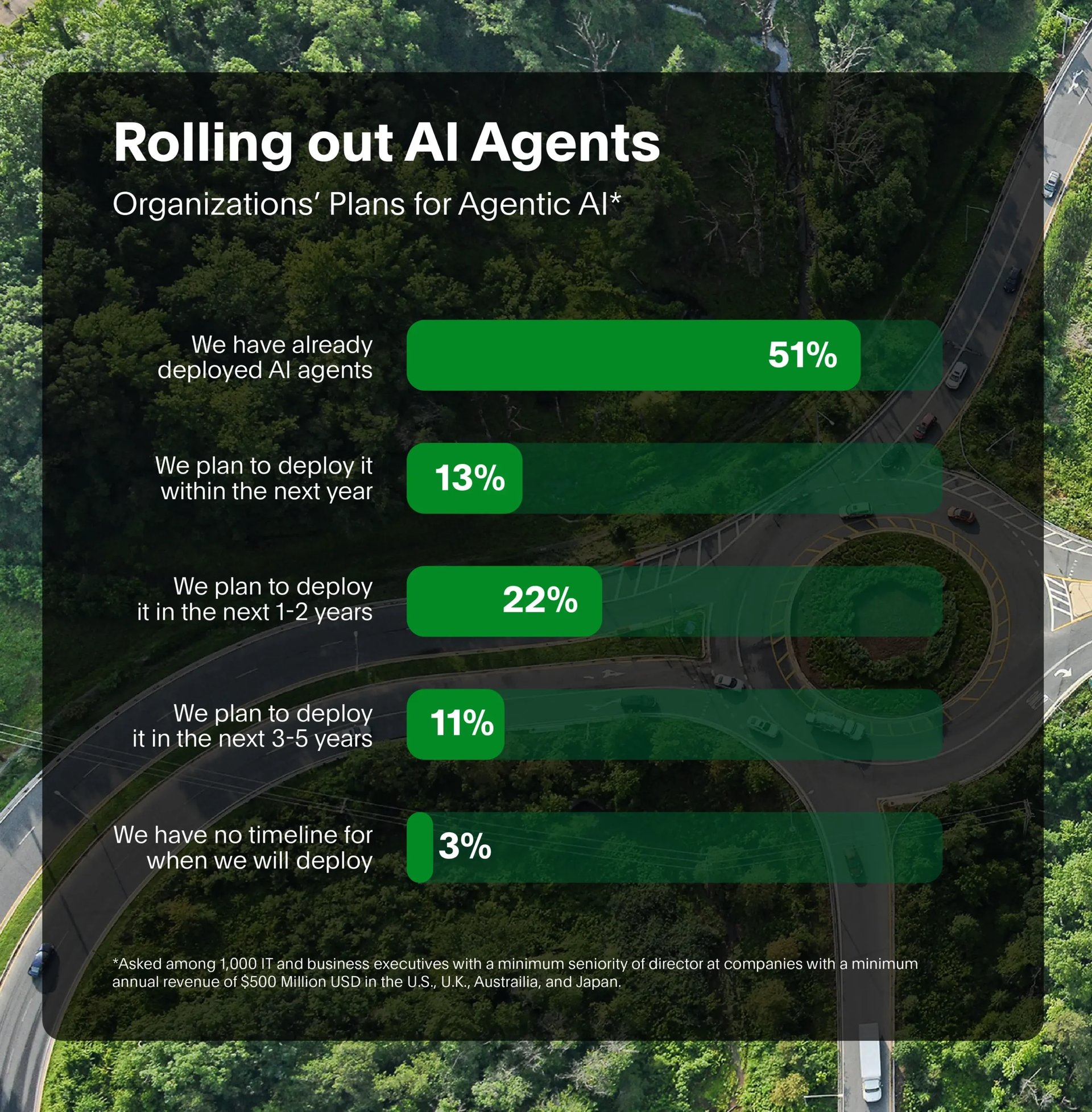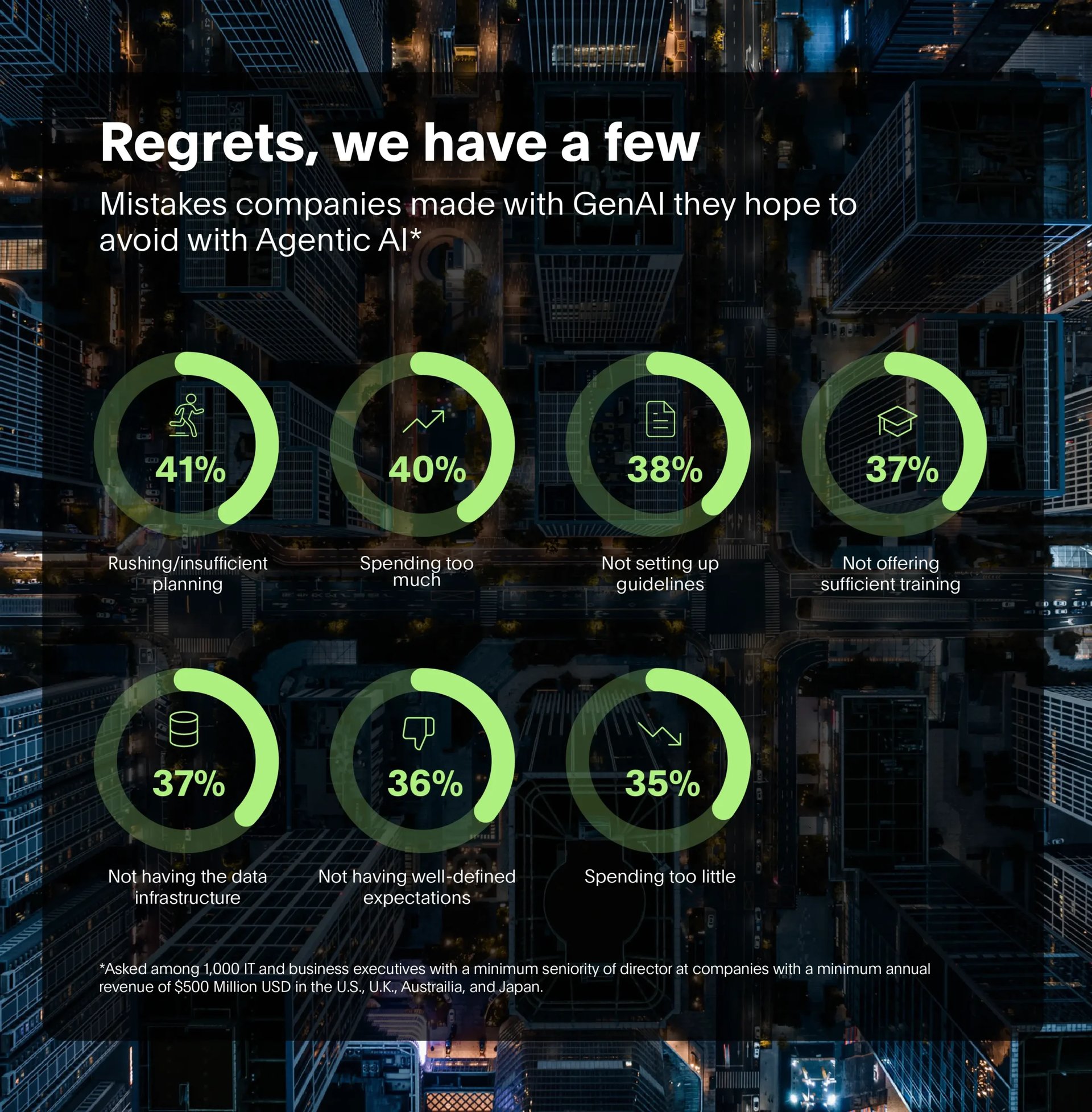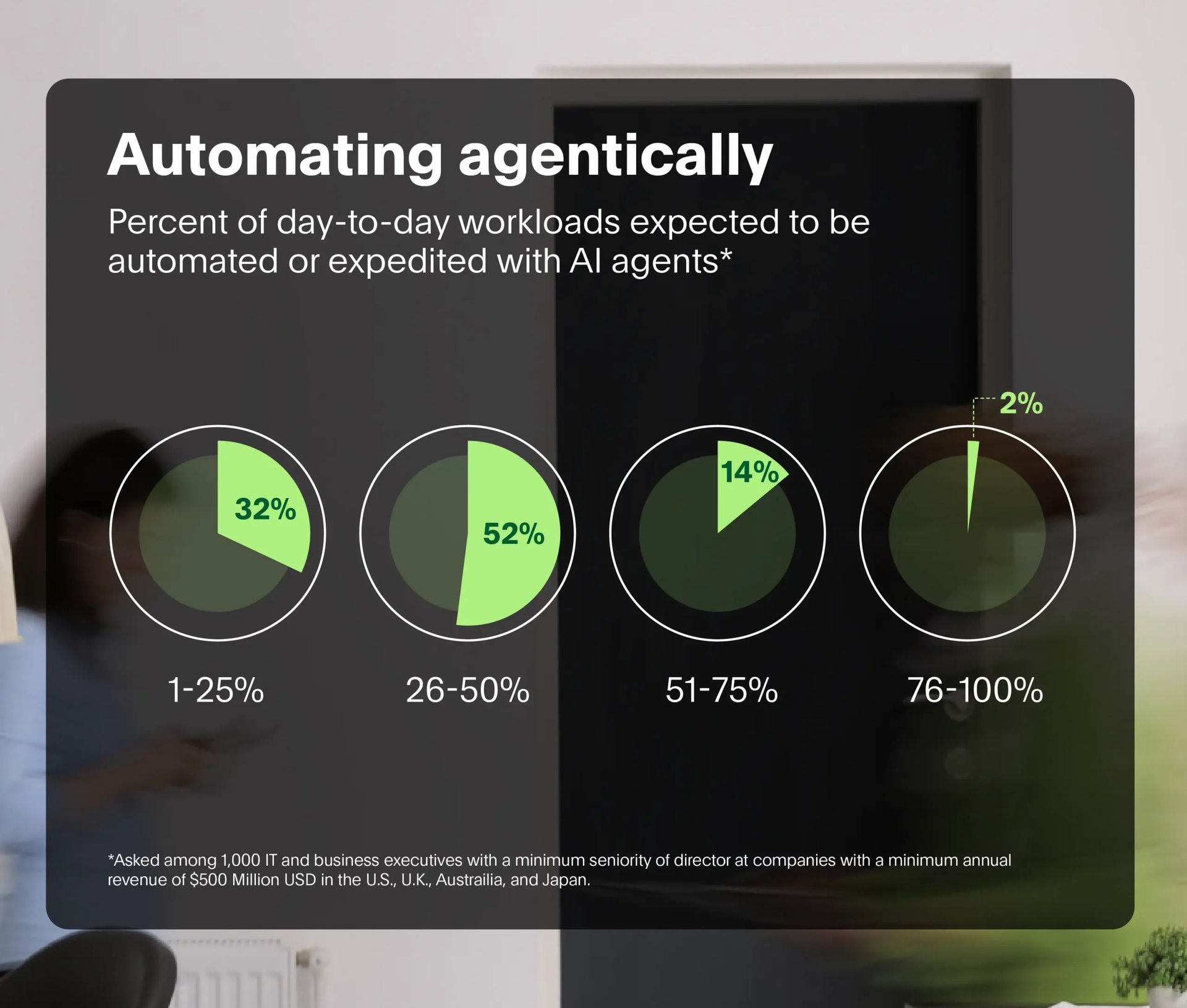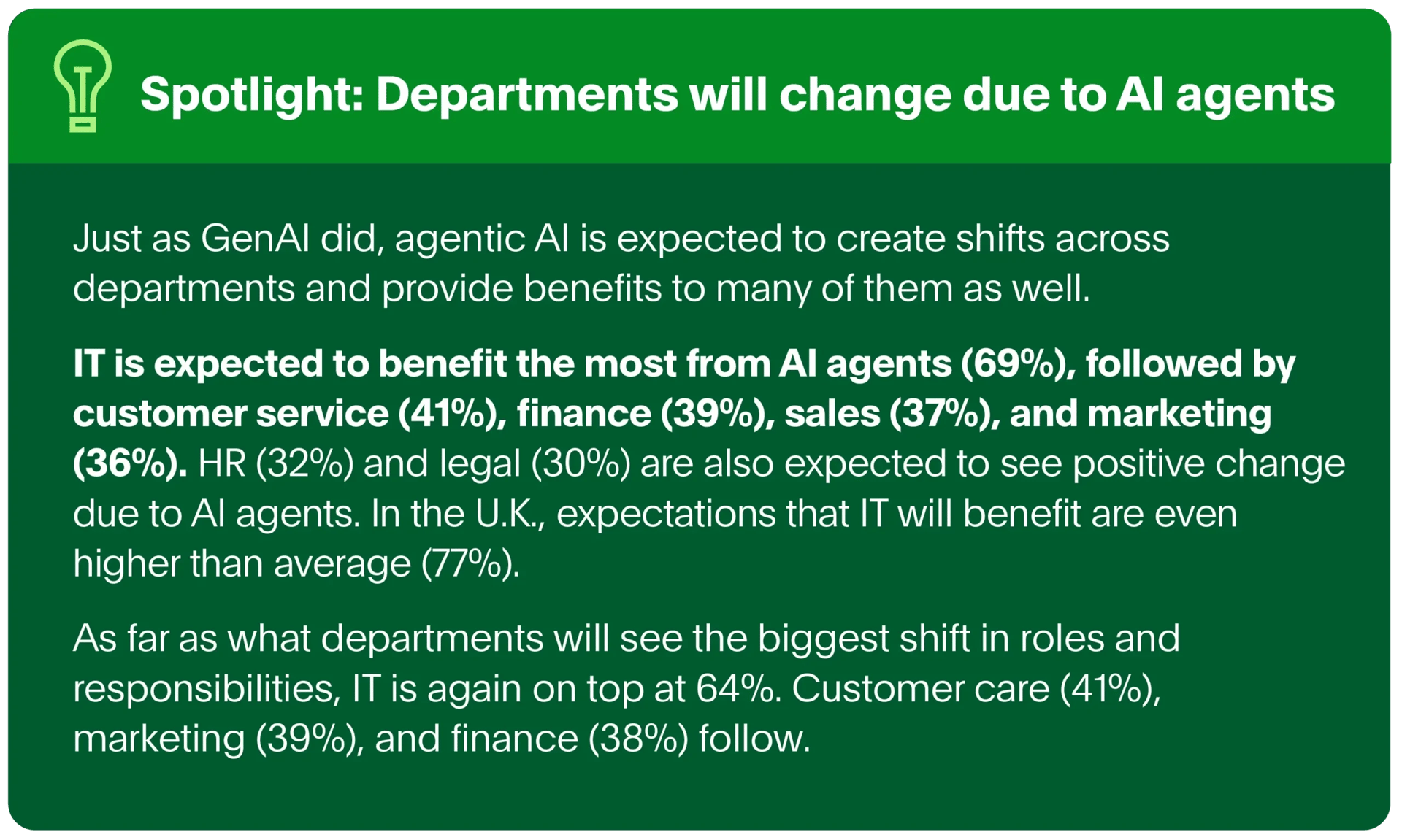Survey: 62% of Companies Expect ROIs of More than 100% on Agentic AI, Just Like They Experienced with Generative AI
Generative AI (GenAI) has changed, and continues to change, the way companies perform tasks and streamline operations. Now, the next generation of artificial intelligence has arrived, and it’s being deployed faster than you think.
More than half of companies (51%) have already deployed AI agents at their organization and another 35% plan to deploy within the next two years, according to a survey of 1,000 IT and business executives in the U.S., the U.K., Australia, and Japan. In other words, by 2027, fully 86% of companies expect to be operational with AI agents. Some countries are even further ahead in their timelines, with 66% of U.K. companies and 60% of Australian firms having deployed. U.S. companies are not far behind accounting for 48%, while Japan lags at 32%.

From GenAI to Agentic AI. Companies who were early adopters ofGenAI are flocking to agentic AI. Those that have fully implemented GenAI are much more likely (71%) to have deployed agentic AI by now than those that have not completely implemented GenAI (19%).
Expected Returns. Companies are very bullish on what they think their investments in agentic AI can deliver. More than three-fifths (62%) expect more than 100% ROI on the technology, with the average expected return at an astounding 171% ROI on their investment. U.S. companies expect an average ROI of almost 2x (192%). Why the high expectations? GenAI has proved profitable for these companies with an average return of 152%, with 62% of companies experiencing more than 100% returns from generative AI.
Fast-Track Adoption. The learning curve on GenAI has paved the way for smoother adoption, as nearly all (94%) believe they will adopt agentic AI more quickly than GenAI. Overall, 55% strongly agree that the transition will be quicker, with Australian companies even more likely (61%) to have strong feelings about it.
Agentic Impact. Will agentic AI rise to the level of disruption that GenAI did? Companies are split on whether they think we’re in store for as significant a shift, with 44% expecting agentic AI to have a bigger impact while 40% think ultimately GenAI will have a greater effect. IT leaders were more likely (51%) than business leaders (37%) to predict agentic AI will wind up having the bigger impact. About 16% opted out of a preference in their belief that both will have about the same impact.

Lessons Learned. Rushing in too quickly or lacking planning in their implementation is a mistake 41% hope not to repeat. As they adopt AI agents, companies are drawing from their past experiences with GenAI and hoping to avoid some of the pitfalls they previously encountered.
- Directors were more likely (43%) to point to lack of training as a GenAI mistake versus C-suite executives and owners (29%).
- Not having well-defined ROI expectations is a mistake 36% made that they hope to avoid this time. 40% of leaders are worried about spending too much, while 35% are worried about spending too little, suggesting that despite the high expectations around the return on AI investments, uncertainty about spending levels persists.
Ballooning Budgets. With the AI needs of companies growing, budgets are accommodating that growth. Three fourths of companies (75%) surveyed are spending $1 million or more on AI. Companies with 10,000 or more employees are more likely than smaller companies to have already spent $1 million or more on GenAI (82% versus 71%) and plan to spend an additional $1 million or more allocation for AI agents (72% versus 60%).
State of GenAI. The adoption of agentic AI is coming just as companies are feeling confident about where they are with GenAI. The majority (63%) have fully integrated GenAI into their company. Another 24% deployed GenAI, but don’t consider it fully integrated into their operations. The U.K. and Australia lead on GenAI with 73% of U.K. companies fully integrating generative AI compared to 69% of Australian companies, 64% of U.S. companies, and 44% of companies in Japan.

Agents of Automation. There are high hopes that agentic AI will help companies not only improve customer service and cybersecurity, but help streamline day-to-day tasks and reduce toil for their teams. More than half (52%) of companies expect agentic AI to automate or expedite 26% to 50% of those workloads. Another 32% have more modest expectations of 25% or less automation of work tasks. The average overall was an expectation of 36% of work tasks automated or expedited with the help of AI agents.
Teaching Tracks. Not training employees enough on GenAI was a mistake some companies regret, and they’re looking to avoid the same outcome for agentic AI. All companies have plans to implement some form of agentic AI training, and for 61%, that means organization-wide seminars or training initiatives. 56% of organizations will offer an external course to their employees. Officially hosted office hours and formal internal mentorship is planned as well (52%, respectively).
Cautionary Tales. As useful as companies may find agentic AI, they also see that the technology can bring with it some dangers, as it did with GenAI. The top two risks companies expect from implementing agentic AI are security vulnerabilities (45%) and AI-targeted cyber attacks (43%). Others include evolving regulations and privacy laws (42%), bad data inputs leading to decreased output quality (40%), and AI hallucinations (37%).
SPOTLIGHT

Full report can be downloaded here
METHODOLOGICAL NOTES
The PagerDuty Agentic AI Survey was conducted by Wakefield Research among 1,000 IT and Business Executives, with a minimum seniority of Director, at companies with a minimum annual revenue of $500m USD. The research was conducted in the following four markets: U.S., U.K., Australia, and Japan with quota set for 250 respondents per market, within each market a 50/50 quota was set for IT Executives and Business Executives, between February 27th and March 6th, 2025, using an email invitation and an online survey. For the purpose of this survey, “agentic AI,” was defined as: “autonomous agents designed to gather data, make decisions, and execute tasks to achieve predefined goals. Unlike AI chatbots, agentic AI may be employed for more context-aware conversations, continuous learning, and personalized responses for a wider range of tasks.”
Results of any sample are subject to sampling variation. The magnitude of the variation is measurable and is affected by the number of interviews and the level of the percentages expressing the results. For the interviews conducted in this particular study, the chances are 95 in 100 that a survey result does not vary, plus or minus, by more than 3.1 percentage points in the global sample, and 6.2 percentage points in each market from the result that would be obtained if interviews had been conducted with all persons in the universe represented by the sample.